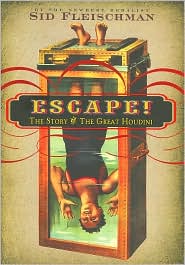
As a wee lad I remember our school librarian reading Sid
Fleischman's The Whipping Boy aloud to us after it won the
Newberry Medal. Unfortunately, Mr.
Fleischman and I parted ways shortly thereafter, and I didn't read another of
his many, many books until quite recently. Shame on me.
Escape is
Fleischman's biography of Harry Houdini, who, if he wasn't the greatest magician of all time, was at least the person who worked tirelessly to make sure
that he was remembered as the greatest magician of
all time.
Fleischman starts at the beginning, when the great Harry Houdini was still just the humble Hungarian immigrant and Rabbi's son, Erich Weiss. From there,
Fleischman chronicles every step of Houdini's journey: running away from home, failed attempts at legitimate labor, traveling circuses and vaudeville shows, to finally headlining and international
superstardom.
Along the way we are shown the world of professional magic, a subject that
Fleischman, a former
professional magician himself, writes knowledgeably and passionately about. However,
Fleischman remains frustratingly true to the magician's code and refuses to divulge any of the mysteries surrounding Houdini's tricks, even though he, as he
constantly reminds the reader, not only knows the secrets, but has performed them on many an occasion.
Thus, the secrets of the disappearing elephant, walking through walls, the metamorphosis trunk, and all of those wonderful death-defying escapes remain just those: secrets.
Fleischman never shies away from Houdini the showman and Houdini the egomaniac. Like all great biographies,
Fleischman portrays his subject warts and all. Not only does he cover Houdini as the greatest showman of his (or perhaps any other) time, but he also recounts Houdini as restless, insecure and petty, doing everything possible (airbrushing other people out of a photograph of him and Teddy Roosevelt, and
embellishing the stories surrounding his greatest escapes) to destroy the reputations of his competition and ensure that the spotlight shone on him alone. Houdini even wrote a book called
The Unmasking, which trashed the memory of the great French magician Robert
Houdin, the man responsible for inspiring Houdini to become a magician. Houdini was such a fan that he adopted his stage name because someone mistakenly told him that an "i" at the end of a name meant like that person. Therefore,
Houdin"i" means Like
Houdin. As
Fleischman writes,
"I think this. Each field has its great icon. Einstein in science. Picasso in art. Edison in invention. There wasn't room for two icons in magic. Robert Houdin had to go."Of course the real bread and butter (and in this case even the title) of any Houdini biography is going to be the escapes. Breaking out of everything from ropes, to handcuffs, to chains, to jails, to Siberian Prison Vans, to the belly of a sea monster (!), to locked trunks thrown into rivers, Houdini escaped from them all. Not only did he escape, but he usually escaped in minutes to the delight and amazement of his audiences. Later, once he realized how to read and work an audience, it was said that he would escape in minutes as usual, but read the paper or play solitaire for 20 minutes or so as the tension and horror in his audience built. He would challenge audience members to present manacles, chains or ropes for him to escape from, and if
no one was forthcoming, he would have one of his plants in the audience "volunteer" something for him to escape from.
Later in his life, there was one thing even the great Houdini could escape from: death. He had become obsessed with debunking spiritualists and mediums, those who preyed upon the grief and sadness of others by claiming to be able to talk to the ghosts of the departed. However, despite his skepticism, Houdini always held out hope that there would be someone who could legitimately communicate with the dead. These contrary impulses probably stemmed from the death of Houdini's beloved mother.
While traveling the country exposing these charlatans as the frauds they were, Houdini also had a standing offer of a monetary reward for anyone who could conclusively communicate with the dead. Upon his own death, Houdini had an agreement with his wife. Anyone claiming to have a communication from the beyond from him would include a code phrase that only hi wife would know. Houdini passed away on Halloween 1926, and I'll leave it to you to determine if he was ever able to escape from his final challenge, death.
All in all,
Fleischman does an admirable job summing up this last obsession of Houdini's:
"[...] otherwise intelligent people can be duped into believing anything, no matter how absurd." I know all of my readers are intelligent, so check out
Escape! in order to look into the life of one of the twentieth century's most fascinating individuals.
 Today's extra special guest blog comes courtesy of the awesomely- monikered Book Monster. Get ready for an in-depth look at a relatively unknown book from an extremely well known author...
Today's extra special guest blog comes courtesy of the awesomely- monikered Book Monster. Get ready for an in-depth look at a relatively unknown book from an extremely well known author...




